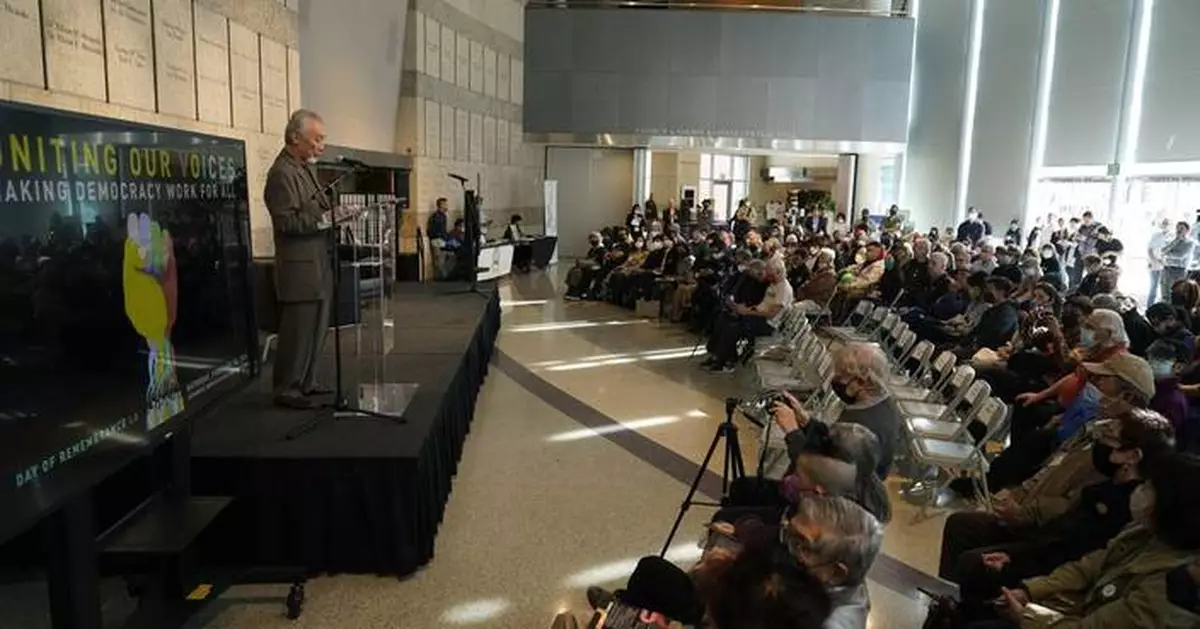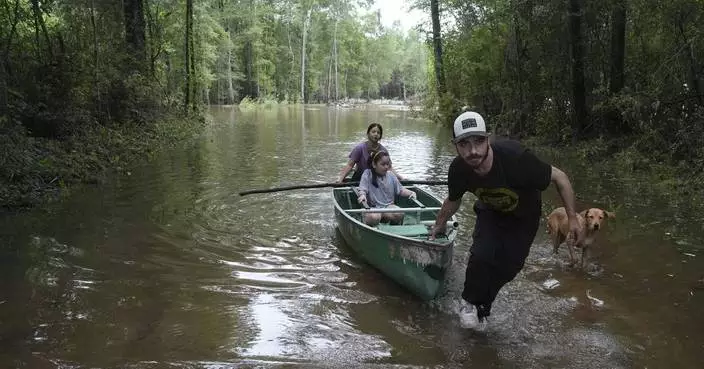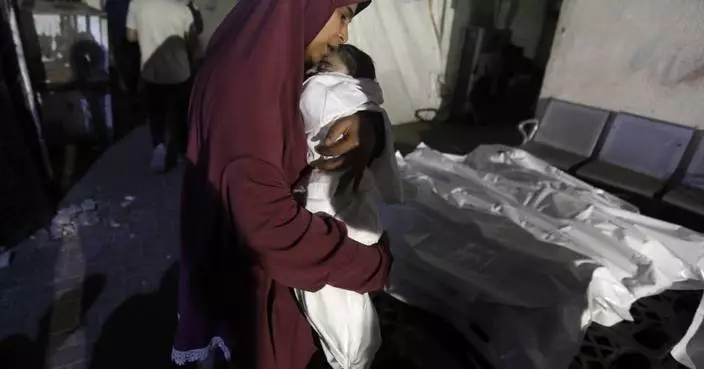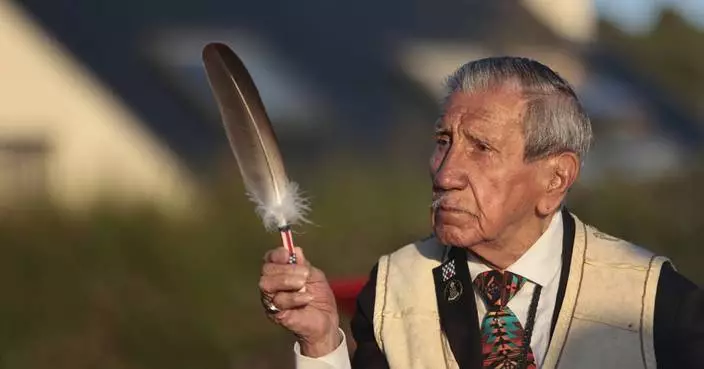LOS ANGELES (AP) — The names of thousands of people held in Japanese American incarceration camps during World War II have been digitized and made available for free, genealogy company Ancestry announced Wednesday.
The website, known as one of the largest global online resources of family history, is collaborating with the Irei Project, which has been working to memorialize more than 125,000 detainees. It's an ideal partnership as the project's researchers were already utilizing Ancestry. Out of over 60 billion records Ancestry holds, nearly 350,000 have been found to be pertinent to camp detainees and their families.
People will be able to look at more than just names and tell “a bigger story of a person,” said Duncan Ryūken Williams, the Irei Project director.
"Being able to research and contextualize a person who has a longer view of family history and community history, and ultimately, American history, that's what it's about — this collaboration,” Williams told told The Associated Press exclusively.
In response to the 1941 attack by Japan on Pearl Harbor, President Franklin D. Roosevelt signed Executive Order 9066 on Feb. 19, 1942, to allow for the incarceration of people of Japanese ancestry. The thousands of citizens — two-thirds of whom were Americans — were unjustly forced to leave their homes and relocate to camps with barracks and barbed wire. Some detainees went on to enlist in the U.S. military.
Through Ancestry, people will be able to tap into scanned documents from that era such as military draft cards, photographs from WWII and 1940s and ’50s Census records. Most of them will be accessible outside of a paywall.
Williams, a religion professor at the University of Southern California and a Buddhist priest, says Ancestry will have names that have been assiduously spell-checked. Irei Project researchers went to great efforts to verify names that were mangled on government camp rosters and other documents.
“So, our project, we say it's a project of remembrance as well as a project of repair,” Williams said. “We try to correct the historical record.”
The Irei Project debuted a massive book at the Japanese American National Museum in Los Angeles that contains a list of verified names the week of Feb. 19, which is a Day of Remembrance for the Japanese American Community. The book, called the Ireichō, will be on display until Dec. 1. The project also launched its own website with the names as well as light installations at old camp sites and the museum.
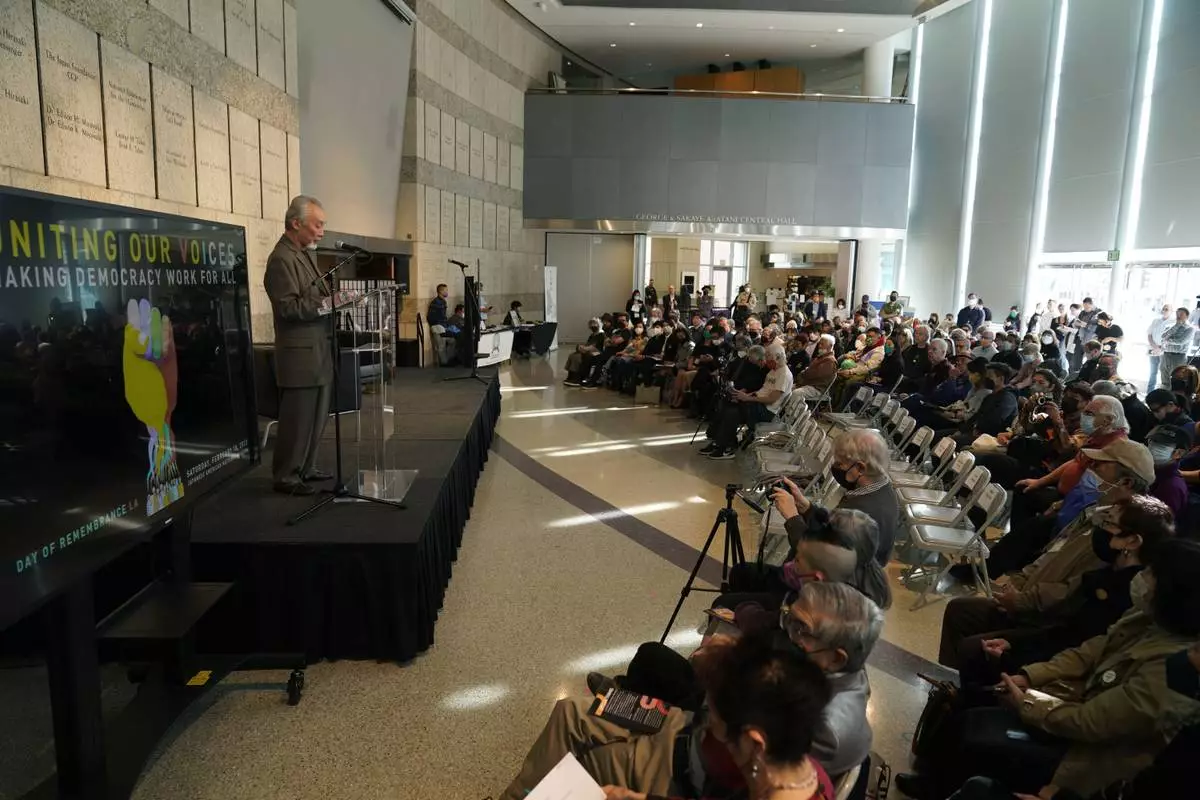
FILE - Richard Katsuda, educator and co-chair of Nikkei for Civil Rights and Redress opens the LA Day of Remembrance at the Japanese American National Museum in Los Angeles, Feb. 18, 2023. The names of thousands of people held in Japanese American incarceration camps during World War II will be digitized and made available for free, genealogy company Ancestry announced Wednesday, April 24, 2024. (AP Photo/Damian Dovarganes, File)
JERUSALEM (AP) — The Israeli army on Monday ordered tens of thousands of people in the southern Gaza city of Rafah to begin evacuating, signaling that a long-promised ground invasion could be imminent.
The announcement complicated last-ditch efforts by international mediators, including the director of the CIA, to broker a cease-fire. Hamas and Qatar, a key mediator, have warned that an invasion of Rafah could derail the talks.
Israel has described Rafah as the last significant Hamas stronghold after seven months of war, and its leaders have repeatedly said they need to carry out a ground invasion to defeat the Islamic militant group.
Lt. Col. Nadav Shoshani, an army spokesman, said some 100,000 people were being ordered to move to a nearby Israel-declared humanitarian zone called Muwasi. He said Israel was preparing a “limited scope operation” and would not say whether this was the beginning of a broader invasion of the city. But last October, Israel did not formally announce the launch of a ground invasion that continues to this day.
The move comes a day after Hamas militants carried out a deadly rocket attack from the area that killed three Israeli soldiers.
Shoshani said Israel published a map of the evacuation area, and that orders were being issued through leaflets dropped from the sky, text messages and radio broadcasts.
He said Israel has expanded humanitarian aid into Muwasi, including field hospitals, tents, food and water.
Israel's army said Monday on the social platform X it would act with “extreme force” against militants and urged the population to evacuate immediately for their safety.
Israel's plan to invade Rafah has raised global alarm because of the potential for harm to more than a million Palestinian civilians sheltering there.
About 1.4 million Palestinians — more than half of Gaza’s population — are jammed into the town and its surroundings. Most of them fled their homes elsewhere in the territory to escape Israel’s onslaught and now face another wrenching move, or the danger of facing the brunt of a new assault. They live in densely packed tent camps, overflowing U.N. shelters or crowded apartments, and are dependent on international aid for food, with sanitation systems and medical facilities infrastructure crippled.
The U.N. agency that has helped millions of Palestinians in Gaza and the West Bank for decade, known as UNRWA warned on Monday of devastating consequences of a Rafah offensive, including more civilian suffering and deaths. The agency said it would not evacuate and stay in Rafah as long as possible to continue providing lifesaving assistance.
The United States, Israel's closest ally, has repeatedly urged Israel not to carry out the invasion, saying it does not have a credible plan to protect civilians.
But even as the U.S., Egypt and Qatar have pushed for a cease-fire agreement, Prime Minister Benjamin Netanyahu repeated last week that the military would move on the town “with or without a deal” to achieve its goal of destroying the Hamas militant group.
On Sunday, Defense Minister Yoav Gallant claimed Hamas wasn’t serious about a deal and warned of “a powerful operation in the very near future in Rafah." His comments came after Hamas attacked Israel’s main crossing point Sunday for delivering assistance, killing three soldiers.
Shoshani would not say whether the upcoming Rafah operation is a response to Sunday's killing. He said the incident would have no effect on the amounts of badly needed aid entering Gaza because other crossing points remain operational.
He wouldn't comment, however, on U.S. warnings not to invade and wasn't clear on whether the evacuation was coordinated with Egypt.
Egypt, a strategic partner of Israel, has said that an Israeli military seizure of the Gaza-Egypt border — which is supposed to be demilitarized — or any move to push Palestinians into Egypt would threaten its four-decade-old peace agreement with Israel.
In Rafah, people received flyers Monday morning in Arabic detailing which neighborhood blocks needed to leave and where humanitarian zones had expanded to. The flyers said that aid services would spread from Deir al Balah in the north to the center of Khan Younis city in the middle of the Gaza Strip.
Palestinians in Rafah said people gathered to discuss their options after receiving the flyers. Most said they did not want to move alone and preferred to travel in groups.
“So many people here are displaced and now they have to move again, but no one will stay here it’s not safe,” Nidal Alzaanin told The Associated Press by phone.
Alzaanin, a father of five, works for an international aid group and was displaced to Rafah from Beit Hanoun in the north at the start of the war.
He said people are concerned since Israeli troops shot at Palestinians as they moved during previous evacuation orders.
Alzaanin said he has packed his documents and bags but will wait 24 hours to see what others do before relocating. He said he has a friend in Khan Younis whom he hopes can pitch a tent for his family.
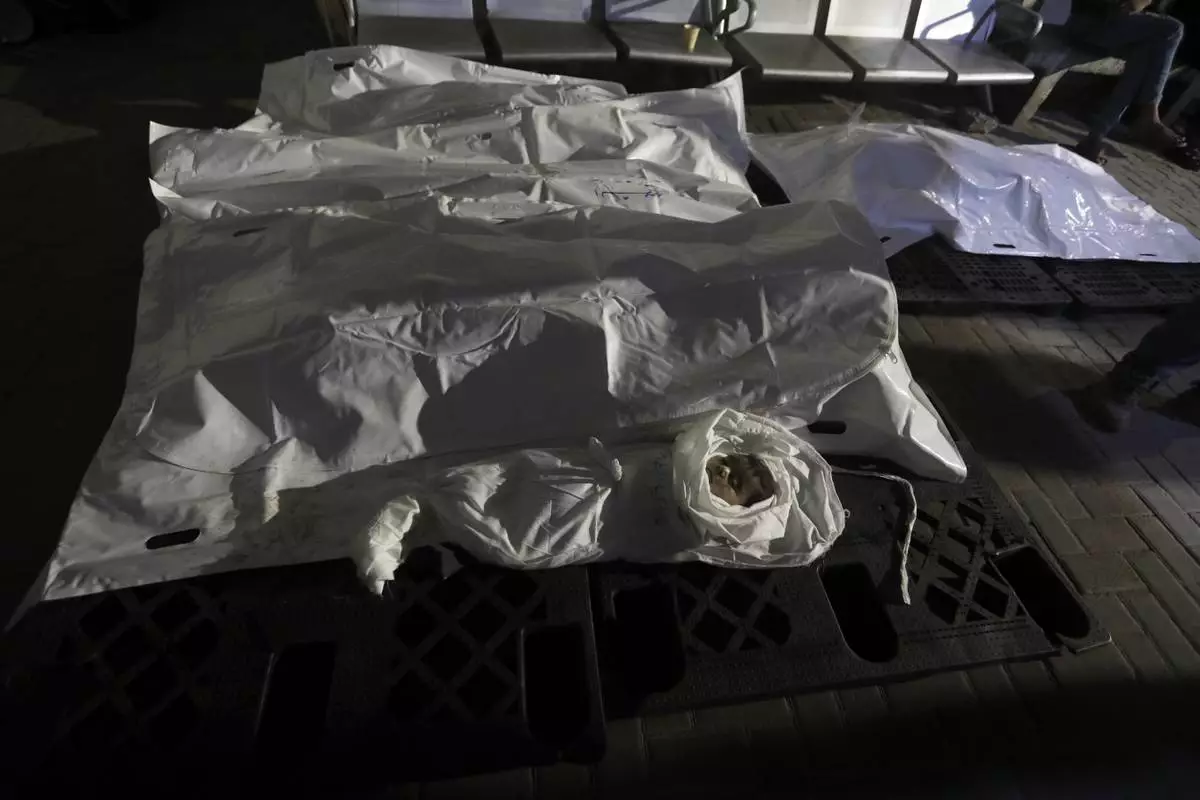
The Qeshta family is seen in body bags at the morgue of Al Najjar hospital in Rafah, southern Gaza Strip, Sunday, May 5, 2024. The family was killed in an Israeli bombardment on a residential building in Rafah. (AP Photo/Ismael Abu Dayyah)
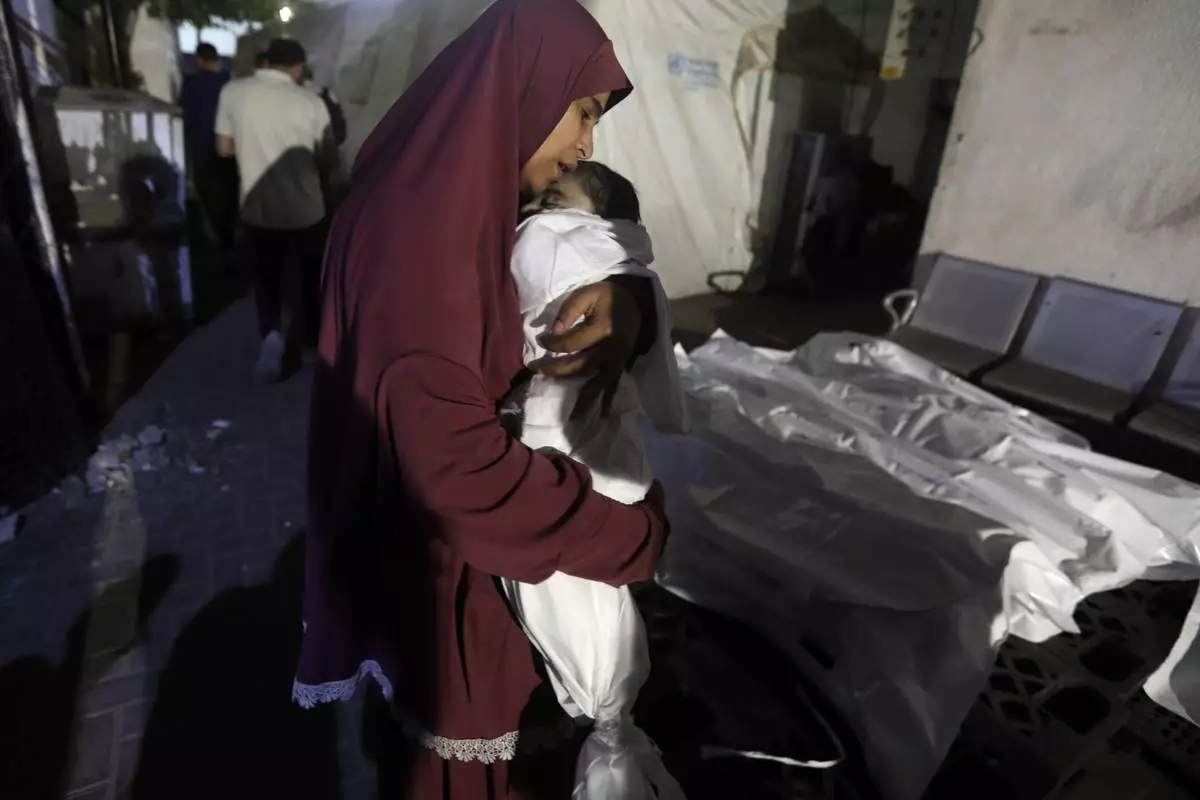
A Palestinian woman mourns her relative, 7-month old baby Hani Qeshta, who was killed in an Israeli bombardment on a residential building with Qeshta's family, at the morgue of Al Najjar hospital in Rafah, southern Gaza Strip, Sunday, May 5, 2024. (AP Photo/Ismael Abu Dayyah)



